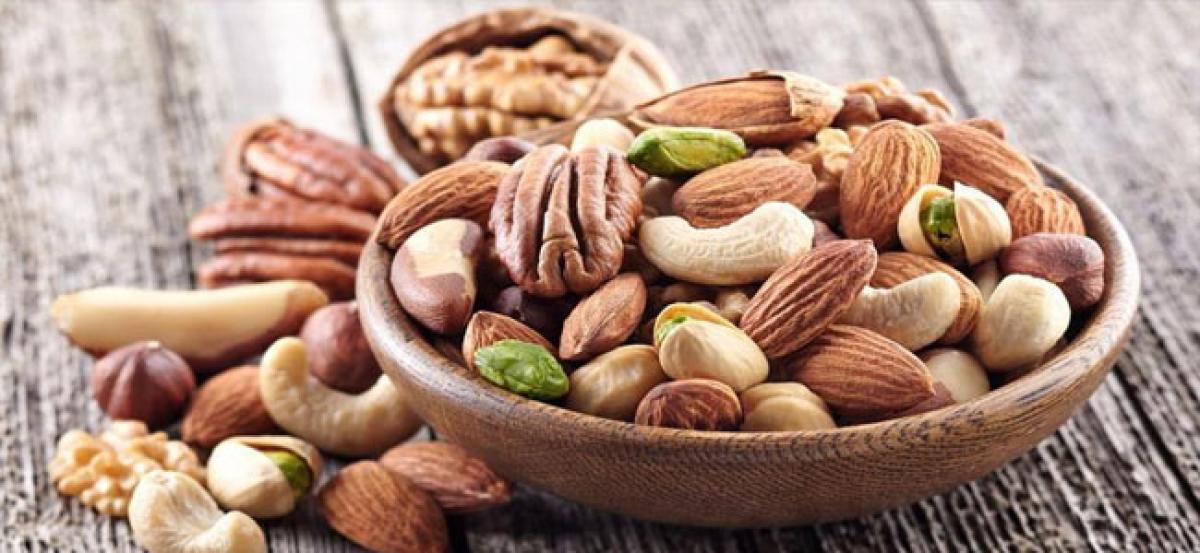Live
- Chanchalguda Jail Officials Say They Haven't Received Bail Papers Yet, Allu Arjun May Stay in Jail Tonight
- BJP leaders present evidence of illegal voters in Delhi, urge EC for swift action
- Exams will not be cancelled: BPSC chairman
- Nagesh Trophy: Karnataka, T.N win in Group A; Bihar, Rajasthan triumph in Group B
- YS Jagan condemns the arrest of Allu Arjun
- Economic and digital corridors to maritime connectivity, India and Italy building vision for future, says Italian Ambassador
- SMAT 2024: Patidar's heroics guide Madhya Pradesh to final after 13 years
- CCPA issues notices to 17 entities for violating direct selling rules
- Mamata expresses satisfaction over speedy conviction in minor girl rape-murder case
- Transparent Survey Process for Indiramma Housing Scheme Directed by District Collector
Just In

Eating several servings of nuts, such as almonds, every week may help lower the risk of developing heart rhythm irregularity and heart flutter, say researchers from Sweden’s Karolinska Institute. It may also lessen the risk of developing heart failure, although the findings are less consistent, according to the research published in the journal Heart.
A new study says that eating several servings of nuts, such as almonds, every week may help lower the risk of developing heart rhythm irregularity and heart flutter.
Eating several servings of nuts, such as almonds, every week may help lower the risk of developing heart rhythm irregularity and heart flutter, say researchers from Sweden’s Karolinska Institute. It may also lessen the risk of developing heart failure, although the findings are less consistent, according to the research published in the journal Heart.
A 2018 review of over 1,500 studies published in the journal Nutrients, had earlier suggested that daily inclusion of almonds as part of a healthy diet can reduce dyslipidemia, one of the most important risk factors for cardiovascular disease among Indians.
The researchers drew on the completed Food Frequency Questionnaire responses and lifestyle information from more than 61,000 45-83 year olds. Their cardiovascular health was then tracked for 17 years (to the end of 2014) or until death. People who ate nuts tended to be better educated and had healthier lifestyles than those who did not include nuts in their diet.
They were less likely to smoke or to have a history of high blood pressure. And they were leaner, more physically active, drank more alcohol and ate more fruit and vegetables. Nut consumption was associated with a lower risk of heart attack, heart failure, atrial fibrillation, also known as heart flutter, and abdominal aortic aneurysm, after taking account of age and sex.
However, when several potentially influential risk factors were accounted for, including lifestyle, general diet, diabetes, and family history, only associations with atrial fibrillation and with heart failure emerged. The more often nuts were included in the diet, the lower was the associated risk of atrial fibrillation, the findings showed.
“Research shows that almonds, which are a source of protein and high in dietary fibre, can help in maintaining healthy blood sugar levels, may improve blood sugar control in people with type 2 diabetes, and help lower the blood sugar impact of carbohydrate foods, which affects fasting insulin levels,” said nutritionist Ritika Samaddar.
Eating a serving of nuts one to three times a month was associated with a lowered risk of just three per cent, rising to 12% when eating them once or twice a week, and to 18% when eating them three or more times a week. The findings for heart failure were less consistent: moderate, but not high, weekly nut consumption was associated with a 20% lower risk.
Each additional portion of nuts eaten during the week was associated with a four per cent lowering in atrial fibrillation risk. “Nut consumption or factors associated with this nutritional behaviour may play a role in reducing the risk of atrial fibrillation and possibly heart failure,” the researchers said. Nuts are a rich source of healthy fats, minerals, and antioxidants, all of which may aid cardiovascular health, they explain.
“A handful of almonds are a source of 15 nutrients such as vitamin E, protein and dietary fibre,” said chef Manish Mehtrotra of Indian Accent. “They are a convenient snack which can be eaten anywhere, any time of the day and through the year. They go with just about any masala/spices. You can also pair them with fruits, or include them in other snacks, while giving them to your family,” said Mehtrotra.

© 2024 Hyderabad Media House Limited/The Hans India. All rights reserved. Powered by hocalwire.com







